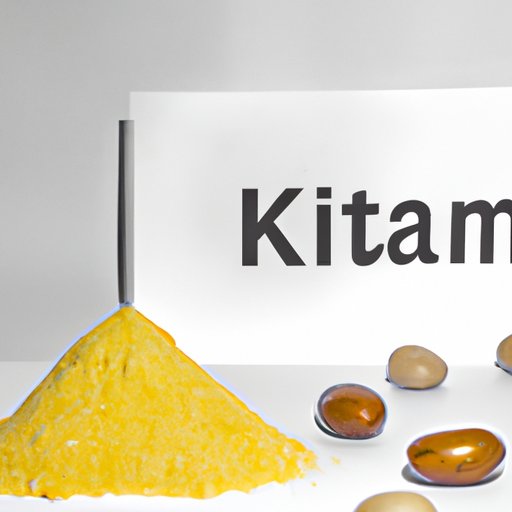Introduction
Potassium is an essential mineral that plays an important role in maintaining the body’s normal functioning. It helps regulate blood pressure, nerve and muscle functions, and heart rate. The recommended daily allowance (RDA) for potassium is 4,700 mg per day for adults, though this varies by age and gender.
Eating Foods High in Potassium: Identifying and Incorporating Them Into Your Diet
Fruits and vegetables are some of the best sources of potassium. Bananas, apricots, oranges, prunes, avocados, spinach, broccoli, mushrooms, and potatoes are all great sources of potassium. Other sources include legumes, nuts, seeds, dairy products, and whole grains.
When trying to increase your potassium intake, it is important to choose nutrient-dense foods. Look for fruits and vegetables that are fresh, organic, and locally grown when possible. Try to incorporate a variety of different types of produce into your diet, as each type of fruit or vegetable will provide different nutrients and minerals. Additionally, try to avoid processed and canned foods as much as possible, as they often contain added sugar and sodium.
Here are some tips for including potassium-rich foods into your diet:
- Add potassium-rich ingredients to salads, soups, stews, and stir-fries.
- Make a smoothie with banana, orange, spinach, and almond milk.
- Snack on dried fruits and nuts like dates, apricots, and almonds.
- Include beans and lentils in your meals for an extra boost of potassium.
- Opt for whole grain breads and cereals that are high in potassium.

How to Increase Your Potassium Intake Through Supplements
Potassium supplements are available in various forms, including pills, capsules, and liquid solutions. They are typically taken in doses of 99 mg or less, but can vary depending on the supplement. Some of the most popular potassium supplements include potassium chloride, potassium citrate, and potassium gluconate.
There are several potential benefits of taking potassium supplements, such as improved cardiovascular health and reduced risk of osteoporosis. However, it is important to consult your doctor before taking any supplements, as they can have side effects if taken in large doses. Possible side effects include nausea, vomiting, stomach pain, and irregular heartbeat.

Tips for Maximizing Your Potassium Intake Without Going Over 4700 mg Per Day
It is important to track your potassium intake to make sure you are not going over the recommended daily allowance. This can be done by keeping a food journal or using a tracking app. Once you know how much potassium you are consuming, you can adjust your diet accordingly to ensure you are getting the right amount.
Natural Ways to Get the Recommended Daily Amount of Potassium
In addition to eating potassium-rich foods, there are also several natural ways to get the recommended daily amount of potassium. Herbal remedies and teas high in potassium include dandelion root, nettle leaf, and alfalfa. Other natural sources of potassium include coconut water, kelp, and chia seeds.

The Benefits of Eating Foods Rich in Potassium
Eating foods rich in potassium can offer many health benefits. Studies have shown that potassium can help improve cardiovascular health by lowering blood pressure, reduce the risk of osteoporosis, and improve nerve function. Additionally, potassium has been linked to a lower risk of stroke, kidney stones, and certain types of cancer.
Creative Ways to Add More Potassium to Your Diet
If you’re looking for creative ways to add more potassium to your diet, there are plenty of delicious recipes and snack ideas with potassium-rich ingredients. Try adding avocado to your sandwiches or tacos, making a potato salad with Greek yogurt, or adding roasted sweet potatoes to your lunch. For snacks, opt for trail mix with nuts and dried fruit, or make your own energy bars with bananas, oats, and nuts.

Understanding the Role of Potassium in Your Body and How to Achieve Optimal Intake Levels
It is important to understand the role of potassium in your body and how to achieve optimal intake levels. The optimal level of potassium intake for adults is 4,700 mg per day. Signs of potassium deficiency include fatigue, muscle cramps, and constipation. To monitor your potassium levels, talk to your doctor about having a blood test done.
Conclusion
Getting the recommended daily amount of potassium is essential for maintaining good health. Eating potassium-rich foods and taking supplements can help you reach the recommended daily allowance of 4,700 mg per day. Additionally, it is important to understand the role of potassium in your body and how to monitor your intake levels. With these tips, you can increase your potassium intake safely and effectively.
(Note: Is this article not meeting your expectations? Do you have knowledge or insights to share? Unlock new opportunities and expand your reach by joining our authors team. Click Registration to join us and share your expertise with our readers.)
